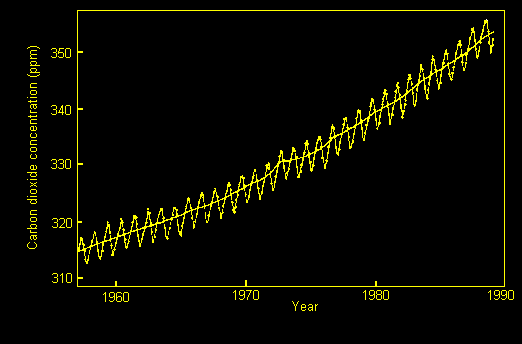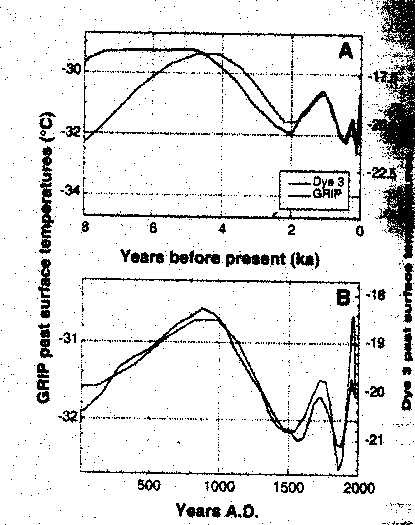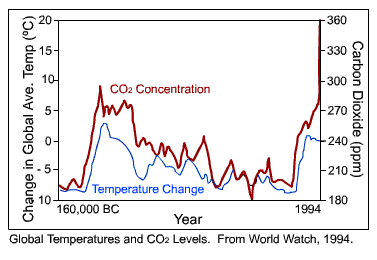In Class:
Question to Ponder
Why is it important that the Earth have a layer of ozone high in its
atmosphere?
- a) Ozone prevents the rest of the atmosphere from leaking out.
- b) Ozone absorbs solar ultraviolet light.
- c) Ozone breaks down to produce the oxygen we breathe.
- d) Ozone acts like a blanket, warming the Earth to a more
habitable temperature.
Why the Montreal Protocol Worked
- The problem was clearly and unambiguously identified.
- The agent responsible for the problem was clearly identified.
- The pollutant source was unambiguously anthropogenic.
- Everyone agreed that specific actions would ameliorate the problem.
The Consequences of Global Warming
- Whether we've caused it or not, global warming is here, and will
likely continue to raise worldwide temperatures for the near future.
- It will cause sea levels to rise nearly everywhere, due to the
fact that water expands when it warms.
- Higher sea levels spell trouble for low-lying countries
(Bangladesh is often cited), not only because of land loss, but also
because of salinization of water supplies.
- Other effects include climate changes that might affect food
belts, insect infestations, and disease migration.
- Higher temperatures will likely lead to lower soil moisture
levels, and perhaps greater need for irrigation in agriculture.
- Climate changes may also force substantial social dislocation as
regions previously conducive to agriculture become less useful, and
other lands become more productive.
- There may be health and food storage concerns for people in urban
areas.
The Greenhouse Effect is Good For You
- Caused by the fact that our atmosphere transmits visible light,
but absorbs infrared light.
- The Sun is very hot, so much of the light it emits lies in the
visible wavelength range.
- This visible light travels through the atmosphere and is absorbed
by land, water, and golden retrievers at ground level.
- The warmed surface material gives of radiation (all heated things
do), but this light is mainly infrared light.
- The infrared light is absorbed by the atmosphere, and thus the
atmosphere warms up.
- The net effect for us is that the Earth's surface is on average
about 50 degrees F warmer than it would be without the atmosphere.
What About carbon dioxide (CO2)?
- Carbon dioxide and water are the two most abundant greenhouse
gases in our atmosphere.
- Water concentrations in our atmosphere range from 1% to 3% or so,
and we probably have little direct control over this (there's just too
much water in the ecosystem for anything we do directly to make a
difference).
- Historically, carbon dioxide levels ranged around 290 ppm (parts
per million).
- During the past 100 or so years, carbon dioxide levels worldwide
have gone steadily up:

- This increase in carbon dioxide levels parallels the
industrialization of the first world, and is almost certainly due to
increased burning of fossil fuels.
- Fossil fuels are essentially the decayed remains of early plant
life, so in some sense we're "undoing" the early process that scrubbed
the CO2 out of the early Earth's atmosphere.
Global Warming
- Also during the past 100 years or so, global mean temperatures
have been rising.
- Rate is approximately one degree F per century, and there's some
evidence that this rate is increasing.
- But Before we blame this increase in increased CO2
level, we need to look at how stable the Earth's temperature has been
historically.
- Ice core evidence suggests that the Earth's temperature has been
variable for the past 10,000 years or so:

A Runaway Greehouse Effect and Global Warming
- As worldwide temperatures rise, the oceans release some of their
CO2 (just like how a Coke goes flat when it warms up).
- As worldwide temperatures rise, polar ice caps melt, reducing the
albedo of the planet and making it a more efficient absorber of solar
radiation.
- However, it may also be true that as temperatures rise, we'll get
more water vapor in the atmosphere, and therefore more clouds, and
since clouds are white, a higher albedo.
- It may also be true that with higher CO2
concentrations and a longer growing season, plants will grow more
rapidly, absorbing CO2 from the atmosphere at a higher
rate.
- The first two effects above are positive feedback effects, in
that they would tend to amplify both the temperature and the
CO2 increases, while the latter two are negative feedback
effects, which would tend to mitigate these increases.
Have We Caused Global Warming?
- The Earth has gone through comparably large (and even larger)
temperature swings without any help from us in the past.
- Still, the link between CO2 concentrations and
greenhouse warming is well-established, and the correlation between
CO2 concentrations and temperature increases over the last
150,000 years is pretty tight.

- But this is exactly why the greenhouse gas issue is a much thornier
problem.
- It's not that the science connecting CO2 to the
greenhouse effect is weak or unclear -- that stuff is very clear.
- It's the connection between what we've done to the atmosphere and
global warming (or global climate change in general) that's unclear.
|
![]()


